
Making every young life Matter
Theirworld President Justin van Fleet discusses acting for early years development, delivering lasting change, and giving every child the best start in life
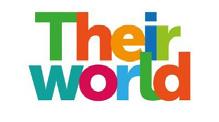
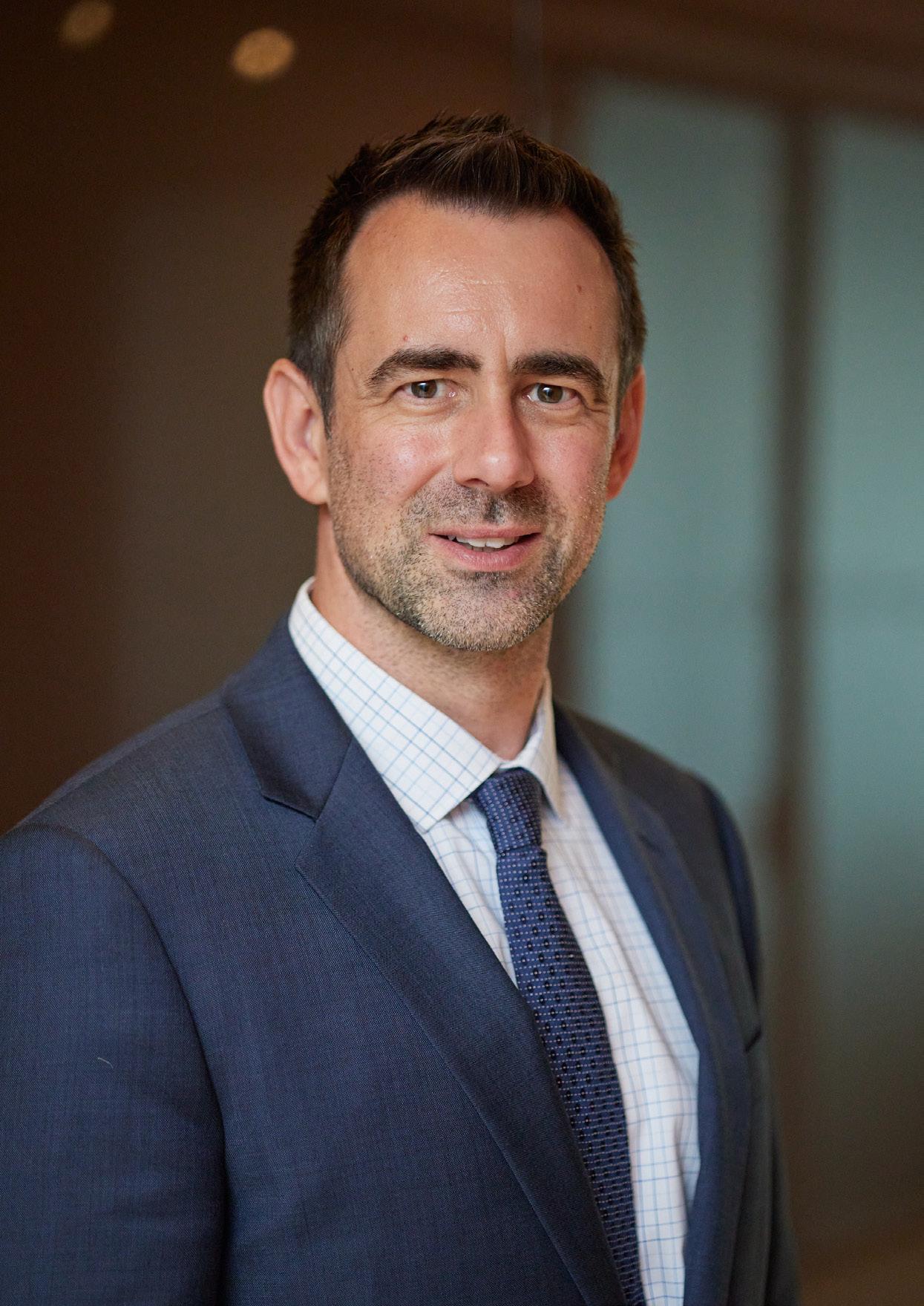
“ for far too long it ’S B een a Privilege , not a rig Ht, to Have early CH ilDH oo D Care ”
JUSTIN VAN FLEET
03 CITIZEN ZERO ——— ISSUE TWO
It’s not every day you meet with an experienced, knowledgeable and passionate leader to discuss the tantrum they’re throwing. But so it is with Theirworld’s Justin van Fleet. In his and his colleague’s defence, the source of their frustration – the chronic lack of investment in early years child care, development and education, and the lack of coherent focus around the need to give every single child worldwide the very best start they can have in life – is a global problem worth getting angry about.
Ninety percent of a child’s brain development takes place between birth and the age of five. For every child, the first five years are a once in a lifetime opportunity to provide foundations that will make a difference for the rest of their lives. Nurturing care across health, nutrition, play, learning, and protection is crucial for development. In particular, early years education improves socialisation, sets children on the road to reaching their full potential, and helps them contribute to
better social equity and more inclusive societies as they grow. There are economic benefits, too. Research has shown that every $1 invested in early childhood care and development can lead to a return of as much as $17 for the most disadvantaged children.
Education rightly underpins sustainable development across the board; the 17 Sustainable Development Goals (SDGs), set out by world leaders eight years ago, make clear its importance for preparing and empowering people to make informed decisions about their health and life, contributing to economic growth and social cohesion, and equipping them to engage in crucial mandates like climate change and environmental preservation. Within SDG4, which comprises seven outcome targets for universal primary and secondary education, early childhood development has its own specific target: to ensure that, by 2030, all girls and boys have access to quality early childhood development, care, and pre-primary education so that they’re ready for primary education.
CITIZEN ZERO ——— ISSUE TWO 04
And yet, we are in crisis. Currently, less than 2% of all early childhood development aid goes towards education. More than 175 million children, close to half of all pre-primary age children globally, are not enrolled in pre-primary education, more than half of the world’s children don’t have access to the childcare they need, and one in three children between 3-4 years of age is not developmentally on track. Investment is crucial to reversing these statistics and breaking cycles of poverty and inequality that can become entrenched early. But that won’t come without a significant change in attitude among governments, policy makers, and donors – in 2021, only 22% of UN member states made pre-primary education compulsory, and only 45% provided at least one year of free pre-primary education.
Which is why we’re talking tantrums with van Fleet. Specifically, Theirworld’s. The organisation, a children’s charity dedicated to ending the global education crisis and unleashing the potential of future generations, has launched its Act for Early Years campaign calling for urgent action to end the early years crisis. The initiative brings together governments, business, international agencies, frontline workers, and other groups to call for greater investment from governments at national and local level, and for the early years to be treated as part of a country’s essential infrastructure.
“WE WERE COMPELLED TO ACT…”
“We were just frustrated,” says van Fleet, discussing the origins of the campaign, which includes a ‘Global Tantrum’ protest at the lack of support for children spearheaded by celebrities and influential figures worldwide. “For far too long it’s been a privilege, not a right, to have early childhood care. And this is a problem that resonates for everyone, it’s not something that only affects certain groups or nations. Everyone, every single community, and every single country is dealing with the impact of the early years crisis and, when we are talking about the ability of a child to thrive or not thrive before the age of five, people become quite animated.
“I remember brainstorming and developing the idea,” he continues. “We were looking at the statistics, analysing the reasons behind the lack of investment and policy, and really understanding how deeply this impacts people, and the entire team felt so frustrated at the lack of action we were compelled to act – we just had to get the word out there. For me, that’s the real power of this particular campaign. It’s something that’s so personal. Everyone can see what it means for their family and friends, so it’s absolutely a cause that’s critical, and which can make such an impact globally.”
Van Fleet’s passion stems from a long affinity with tackling the inequalities and disparities inherent in education and childhood development that began, he explains, in the remote Bolivian countryside. Growing up in rural Appalachia on the West VirginiaMaryland border, van Fleet’s worldview may have been limited at first. But that changed when his aunt and uncle hosted an exchange
05 CITIZEN ZERO ——— ISSUE TWO
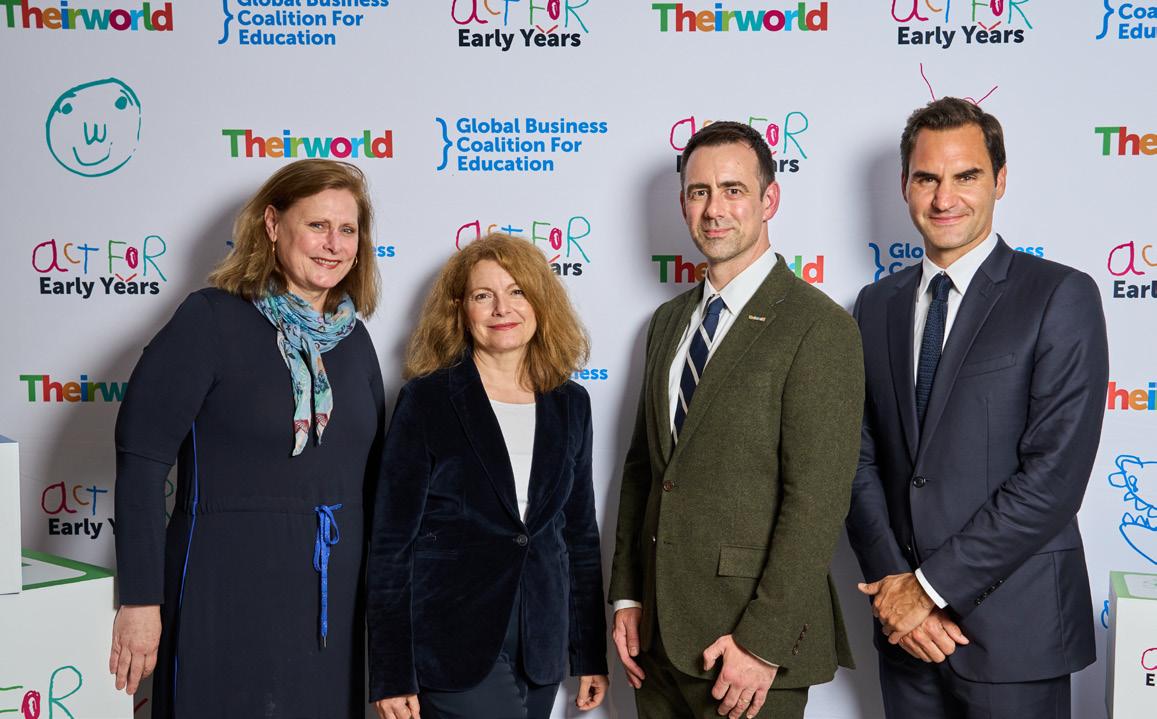
“ i truly B elieve tHat e D u Cation an D early yearS Care i S tH e key tHat unloC kS our SoC ial an D eCono M i C goal S”
student from Spain when he was young and he was inspired to apply to be a foreign exchange student himself. “There were all these countries you could choose from and I just remember putting a big X in a black marker across them and writing ‘I’ll go anywhere in the world, but I’d really like to learn Spanish’. I was accepted with a note telling me ‘congratulations, you’re heading to Bolivia,” he recalls.
“I was 16 and attending a Bolivian high school and it was the first time I’d ever seen people my age not doing the same thing. It was
shocking,” says van Fleet. “It was a wake-up call to the disparity in opportunity that people have from such a young age. I really became interested in the importance of education, why some go to school and others don’t, and of ways to make sure everyone has the opportunity to reach their full potential. When you’re young you think an exchange programme is about learning other cultures, but for me it was a window into the injustice and inequality in the world. It had a real impact on me and, even though I didn’t necessarily think it at the time, has always been the core of who I am and what I care about.”
CITIZEN ZERO ——— ISSUE TWO 06
SDG VIP DINNER DURING UNGA WITH FEDERER FOUNDATION
So much so that van Fleet has built a respected career in education and childhood development, including previously serving as Director of the International Commission on Financing Global Education Opportunity, and as Chief of Staff, UN Special Envoy for Global Education for former UK Prime Minister Gordon Brown. As well as acting as President of Theirworld, he is Chief Executive Officer of one of its key initiatives, the Global Business Coalition for Education, which supports companies with environmental, social, and governance activities in education. Over this period, he says, the landscape for education and children has evolved significantly even though many challenges remain.
“We’ve made progress, but there is still so much to do. Look back to the turn of the century, when the Millenium Development Goals were set out,” van Fleet says. “More than 100 million children were out of primary school and, in the first few years following, the number was dramatically reduced to around 60 million. Of course that brought to the fore many of the challenges, questions and trends we’re still working on beyond just getting children through the school door: what type of education are they receiving? How do we ensure it is the best quality, and how is it delivered? What does effective teaching and learning look like? And what role should technology play in supporting young people going to school?

07 CITIZEN ZERO ——— ISSUE TWO
JUSTIN VAN FLEET AND THEIRWORLD CHAIR SARAH BROWN MEET UKRAINE’S PRESIDENT VOLODYMYR ZELENSKYY
“There are other bright spots I’ve seen firsthand during my time at Theirworld,” he continues. “Ten years ago there wasn’t an emergencies fund for education – when it came to international aid, learning was left to the side and children were out of school for an average of seven to 10 years. It led to our safe schools campaign – Education Cannot Wait – which established a global fund for education in emergencies and protracted crises that has given millions of children the opportunity to attend school. There’s also been progress in the business community and private sector, including our Global Business Coalition for Education, which has created a more joined up approach to organisations addressing education and social responsibility. Early years, though, is an enduring challenge that’s at the top of peoples’ minds because of the need to give children a better start in life and the pressure so many families are under.”
“THE IMPACT IS CATASTROPHIC…”
The early years crisis is a multifaceted one. Around the world, the situation for the youngest members of society and those that care for them – parents, carers, nursery teachers, and teaching assistants – continues to worsen, suffering from both a lack of investment and engagement from government and policy makers.
“Governments just aren’t prioritising the issue overall,” says van Fleet, discussing the context behind the crisis. “Making change, particularly in education, is always challenging. In this instance, you have an environment where there are many competing priorities, particularly in countries where there’s limited capacity or budget.
There’s often a tendency to focus on areas that can provide a hard return to investment, like infrastructure as an example, or on short-term solutions like training people for specific jobs.
“It requires significant coordination, too,” he continues. “This isn’t just about education, but health, employment, social work, and care, meaning governments must work as a system to provide a comprehensive set of services to families. The reality is that for most of the challenges we face, education is the underlying foundation or link. This is about looking beyond short-term fixes and understanding that we have to be investing in the root problem to prepare an entire generation of young people for the future. Act for Early Years is about making governments understand that if they invest in this most fundamental of needs they’re giving every young person the opportunity to contribute to society, participate in the economy, nurture their own families, manage challenges like climate change and so much more. I truly believe that education and early years care is the key that unlocks our social and economic goals.”
The impacts of not making this change are profound. The high cost or poor availability of adequate child care is the main reason women leave their jobs, making families less able to afford the things their children need and businesses and economies lose valuable employees. Without the right support, children are at risk of going through life with poorer physical and mental health, and may struggle to learn or join the workforce later in life.
CITIZEN ZERO ——— ISSUE TWO 08
THE EARLY YEARS CRISIS
Around the world:
More than half of all young children (349 million) do not have the access they need to childcare, and around half of pre-primary-aged children are not enrolled in any form of early education.
At least 175 million children are not enrolled in pre-primary education programmes (UNICEF 2010).
One in four children aged five have never had any form of pre-primary education (UNESCO 2022).
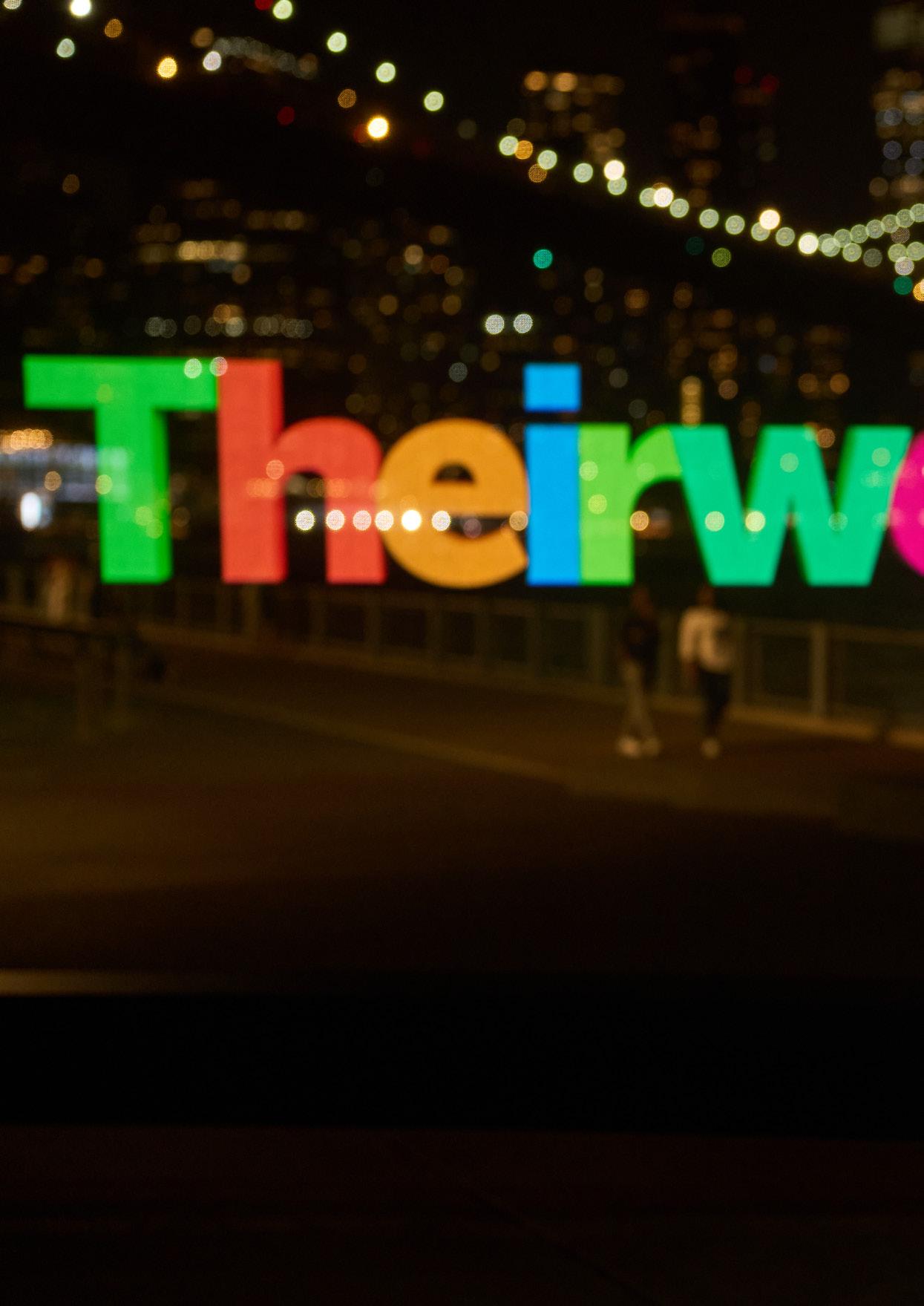
350 million children below primaryschool entry age around the world need childcare but do not have access to it (World Bank, 2021).
Malnutrition and stunting impact an estimated 250 million children under five, thwarting their development at a critical moment in their lives (Ndayizigiye et al 2022).
Of the world’s 100 million displaced people, just under 12 million are estimated to be children under the age of five (Moving Minds Alliance, 2022).
09 CITIZEN ZERO ——— ISSUE TWO
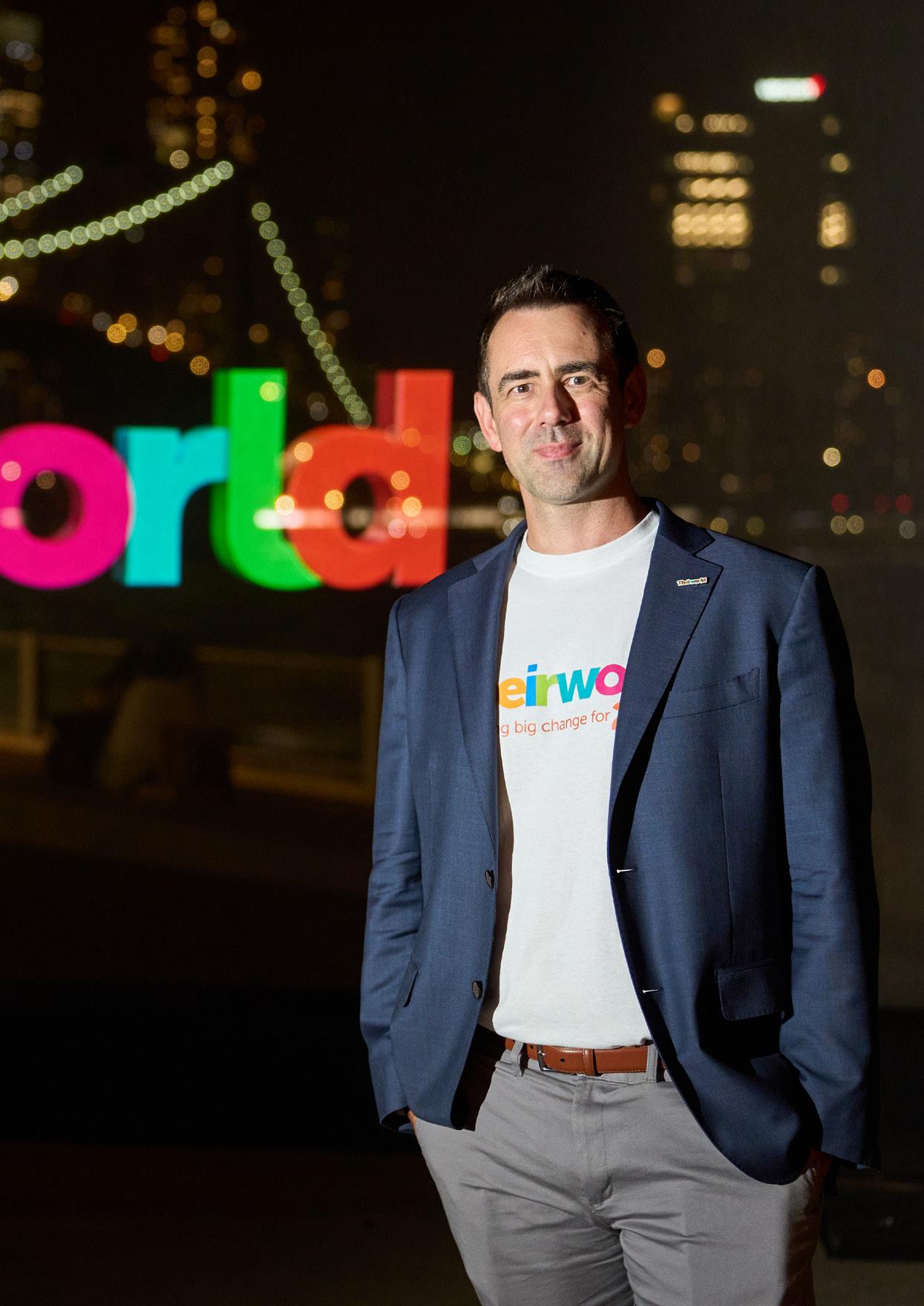
CITIZEN ZERO ——— ISSUE TWO 10
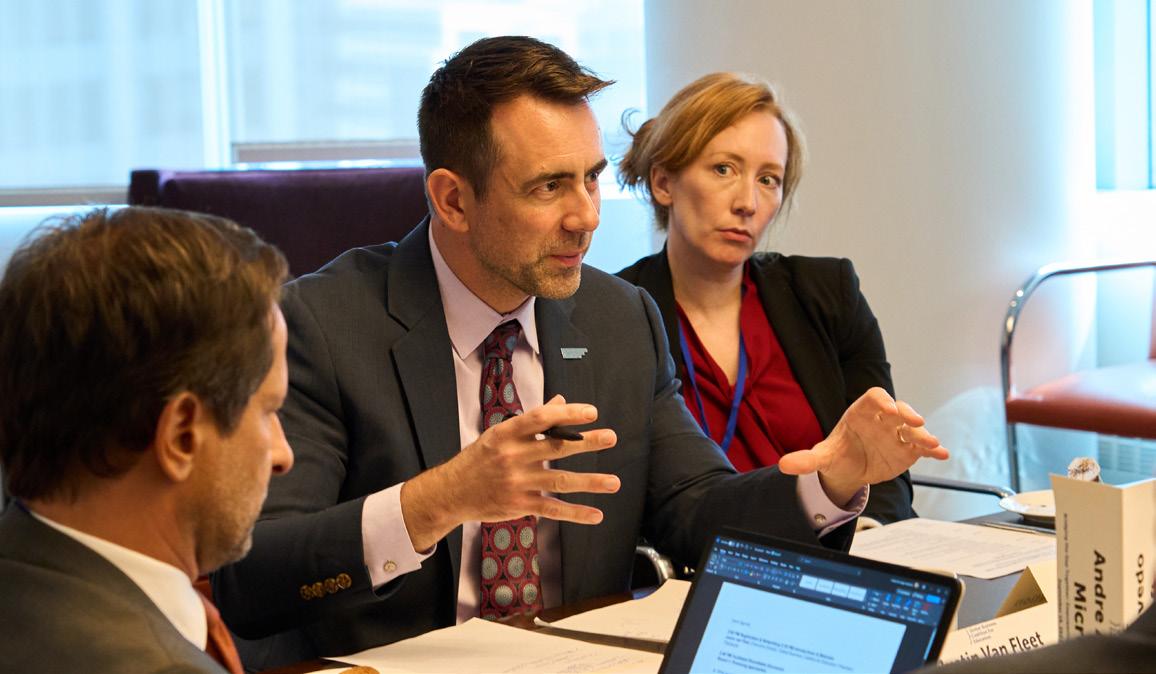
Investment in early years support also helps eradicate cycles of poverty and inequality – children from more prosperous, educated backgrounds tend to begin primary school ready to learn, leaving those with no access to childcare at a major disadvantage. And, in low- and middle-income countries 40% of children are at risk of not attaining their full development potential because of poverty, inadequate nutrition, exposure to stress, and lack of early stimulation and learning.
“The impact is catastrophic,” stresses van Fleet. “Hundreds of millions of children aren’t in the adequate early childhood care or development programmes they need to be in, and millions more will never step into a preschool. Beyond just learning, millions do not benefit from a healthy pregnancy and birth, lack the family support they need, and do not receive the early interventions necessary around health, nutrition, and
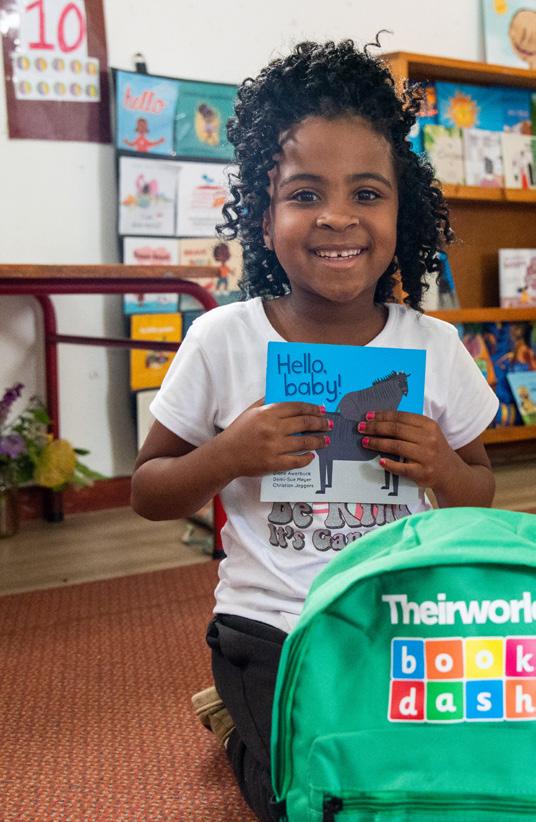
11 CITIZEN ZERO ——— ISSUE TWO
AT THE GBC-EDUCATION UNGA ROUNDTABLE 2023
“ tH i S i S aBout looking B eyon D SH ort-terM fiXeS an D un D erStan D ing tHat We Have to B e inveSting in tH e root Pro B le M to Pre Pare an entire generation of young Peo Ple for tH e future ”
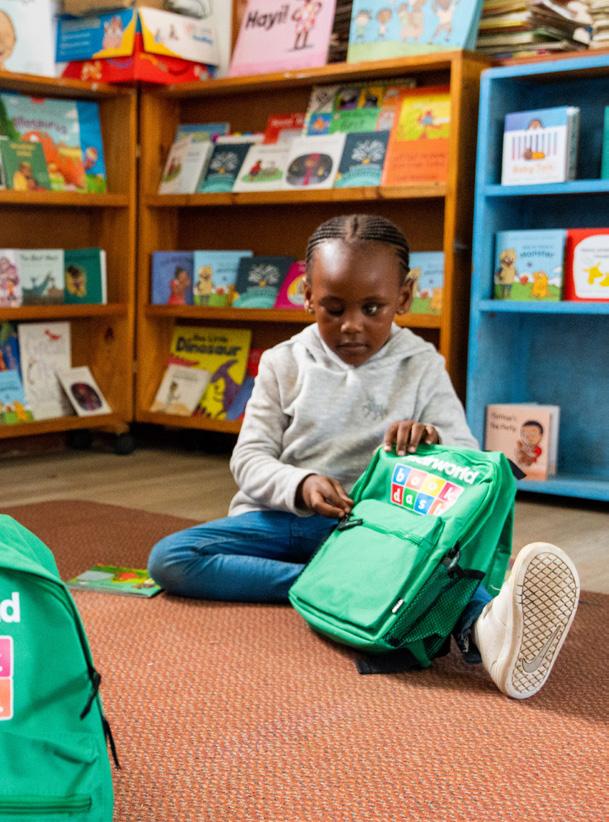
development. The challenge is that all of these crucial interventions are still thought of as things that happen in the home and that parents are supposed to do, while we just make sure there’s a school ready for children once they reach the age of five. It’s hugely unfair and if we continue, we’re just entrenching inequality.
“If 90% of the brain develops in the early years, all we’re doing beyond that is tinkering on the margins of what’s already been developed and nurtured,” he continues.
“The earlier we invest, the better the longerterm trajectories are and the greater opportunity we have to address societal issues around equity and fairness, and tackle things like skills shortages in the workplace. If we’re genuinely concerned about the future, we have to start shifting the needle in a big way and understand that early investment will bring huge value. That’s where we want to make a difference.”
“OUR GOAL IS TO RAISE A BILLION DOLLARS…”
The Act for Early Years campaign calls for radical change, not just with proper investment but also bright ideas and bold policy making across the board. There is early momentum – in the US, President Biden has set the goal of establishing universal preschool care and education for the two years before primary education starts; Canada’s President Trudeau has announced a C$30bn national plan to subsidise childcare; and in early 2023, the UK government said it would provide 30 hours of childcare a week for one- and two-year-olds during the school term. But, says Theirworld, greater unity and global collaboration is essential.
CITIZEN ZERO ——— ISSUE TWO 12
Working with partners and experts, it has set out several key recommended interventions to achieve the vision of universal quality childcare. These are aligned with five integrated intervention packages, originally identified by the World Bank, designed to be delivered across the different stages of a child’s life – family support, pregnancy, birth, child health and development, and preschool – and spanning sectors including education, health, nutrition, water, sanitation, and social protection.
The recommended interventions at the heart of the Act for Early Years campaign include, at national and local government level, to provide sufficient financing to guarantee universal access to affordable, quality childcare, learning, healthcare and nutrition, to set the appropriate policy and legal frameworks so that children may thrive, set out family-friendly support policies, give greater transparency over childhood development spend, and to set and deliver early years investment targets.
It also sets out key actions for the international community, such as setting early years minimum investment targets (as a total percentage of GDP), conducting a five-year review of the G20’s 2018 Initiative for Early Childhood Development, tracking early years investments in aid budgets and programmes, especially those for emergencies and refugee communities, and staging the first International Financing Summit on the early years.
“Our goal is to raise a billion dollars in commitments from governments to prioritise this issue, show their intent to really level up investment, and start taking action on early
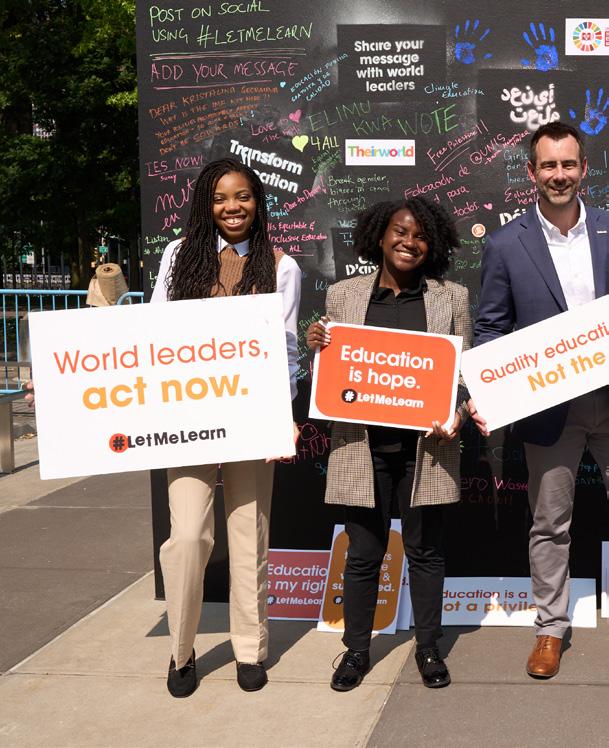
“ if We ’ re genuinely Con C erne D aBout tH e future , We Have to Start SH ifting tH e nee D le in a B ig Way an D un D erStan D tHat early inveStM ent Will B ring H uge value ”
13 CITIZEN ZERO ——— ISSUE TWO
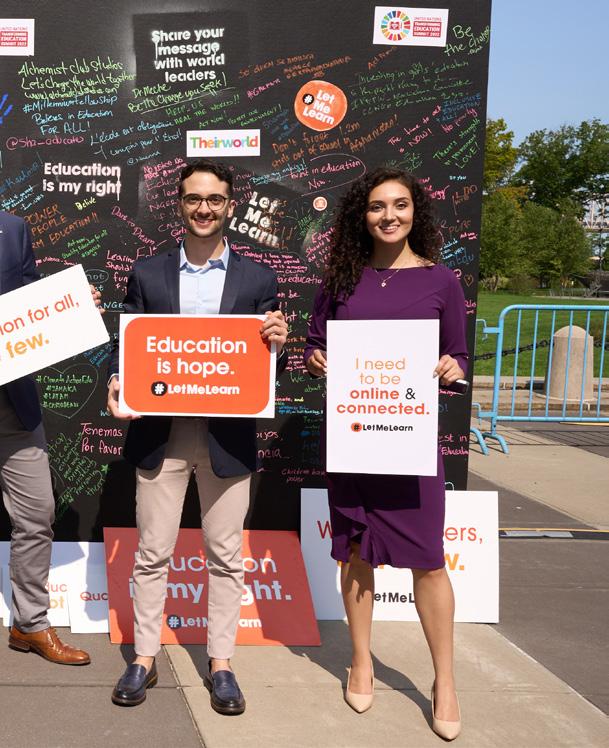
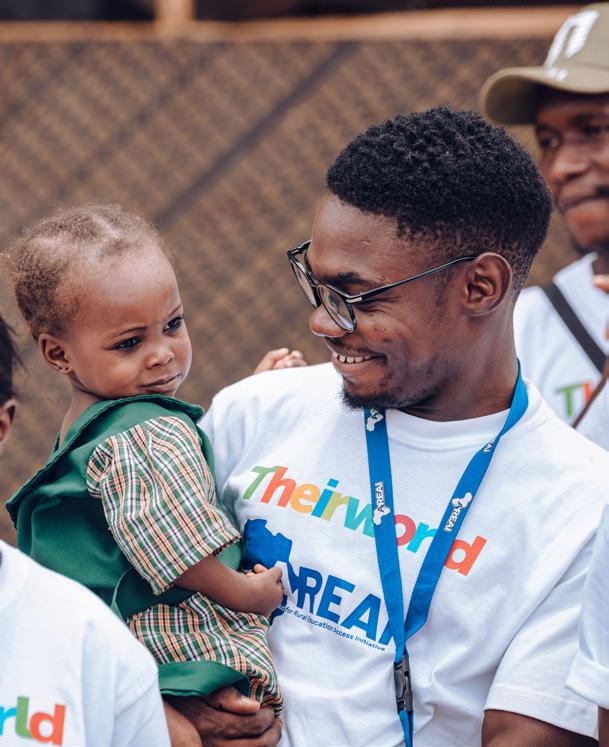
childhood, delivering quality care and education over the first five years of every child’s life – it’s the most important issue,” says van Fleet. “The great thing about having the five packages of interventions and our recommendations is that there’s been so much work and research done in this field that we can provide data on exactly what needs to be done to deliver results.
“When it comes to nutrition, for example, we know what young people need to ensure food security and healthy growth, on engagement we have information that shows how to foster a young person’s development, or make them feel loved, that they belong, and to nurture the early stages of their cognitive development, and when it comes to learning, we know that two years of quality preschool before the age of five is the gold standard for every child,” he says.
“Teachers and carers must be a priority, too,” adds van Fleet. “There are huge shortages in child care workers and preschool teachers that have to be addressed if we’re to deliver change. We don’t pay people well, we don’t reward them or provide professional development, yet we expect them to support and nurture our young people and be responsible for their development. Schools are some of the most unreformed institutions, but the people that work in them absolutely have one of the most important professions on the planet. The solutions exist, but we need each country or community to map them out, create the systems to deliver them, make sure that they’re accessible to all parents, and provide the right level of funding to get results. That’s the core of our campaign.”
CITIZEN ZERO ——— ISSUE TWO 14
“GIVE EVERY CHILD THE BEST START…”
Theirworld has a long history of working to transform the lives of children impacted by conflict, emergencies and crises. Globally, hundreds of millions of children are increasingly living in hostile and dangerous environments and, as a result, have no access to quality education. For these children, early years education is even more important, protecting them from the worst effects of the crises they’re experiencing, providing nurturing care, psychosocial support, and much needed stability, normalcy, and routine.
Close to 10 years ago Theirworld, through its global campaign, was instrumental in the establishing of the Education Cannot Wait fund, the first global fund to prioritise education action in humanitarian emergencies. Its goal was to raise $4bn to provide quality education, ensure education is a top priority during crises, generate and disburse additional financing, and strengthen capacity to respond to crises. At time of writing,
van Fleet had recently returned from a visit to Ukraine. There, he and Theirworld Chair Sarah Brown met President Volodymyr Zelenskyy to discuss the nation’s commitment to being an Act for Early years champion.
Theirworld will support a national early childhood education and development initiative to ensure that Ukrainian children – five million of whom have had their education disrupted since the Russian invasion – can benefit from a safe, quality early education. It will also work to deliver accelerated learning programmes for science and mathematics.
“We’ve worked a lot with Ukraine,” says van Fleet. “In terms of early childhood development there has been a realisation that, in order to incentivise people to return to the country, it’s essential to have high quality services for families including the preschool reform we’re working on now in partnership with the Ukraine Ministry of Education.
“Previously we’ve also supported Stay With Ukraine, a programme with our on-theground project partner Smart Osvita to help young refugees keep in touch with Ukrainian language, learning, and culture while living in other countries.Through the Global Business Coalition for Education, we have worked with key partners like HP and Microsoft to deliver more than 70,000 laptops to children so they can continue to learn,” he adds. “Any crisis is a tragedy with terrible impact on people, but we should also look at them as an opportunity to collectively find opportunities to improve lives. I’m really confident that the work we’ll see over the next year or so in Ukraine will contribute to major developments in early education and development.”
15 CITIZEN ZERO ——— ISSUE TWO
Read the Act for Early Years Report here 1 Introduction Case Report April 2023 A call for a global movement to support the world’s youngest children The Act for Early Years Report Theirworld, April 2023 your Act for Early Years wE nEed help.
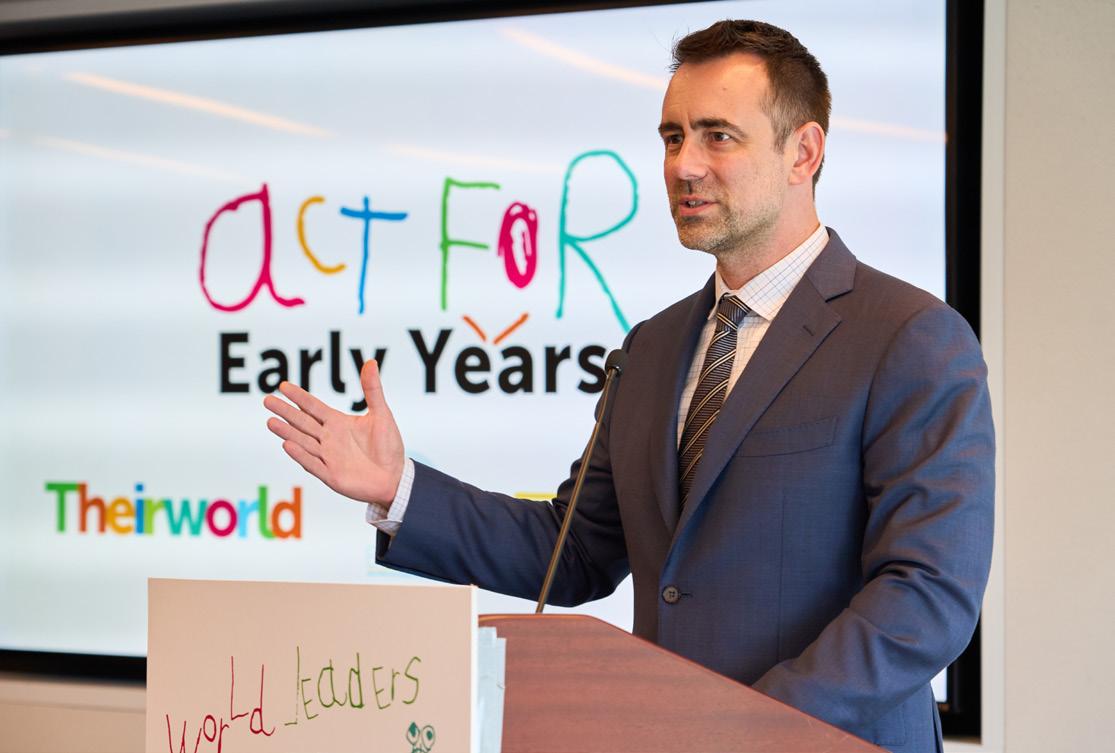
“ our goal i S to rai S e a B illion DollarS an D Co MM itM entS fro M govern M entS to Prioriti S e tH i S i SS ue ”
We could, truth be told, listen to van Fleet discuss his and his colleagues’ work all day – his passion for the subject and desire to see everyone have the best start in life is an inspiring mix. “I love every minute of what we do,” he affirms. “It’s challenging to bring the many complex pieces together to make things happen but what we do so well at Theirworld is to really stick with a campaign or challenge. We dedicate ourselves to the most important issues, often those that require a long or difficult journey and do everything we can to deliver for those that need it.
“I’m really optimistic about what we’re looking to achieve with the Act for Early Years campaign,” he states. “My mission is to raise $1bn from governments, to drive the campaign, and to see the change that’s needed for young people. It’s an incredible opportunity we have and success means every child has the best start in life and a safe place to develop and learn the skills they need for the future.”
theirworld.org actforearlyyears.org
CITIZEN ZERO ——— ISSUE TWO 16
AT THE ACT FOR EARLY YEARS EVENT, 20 SEPTEMBER 2023

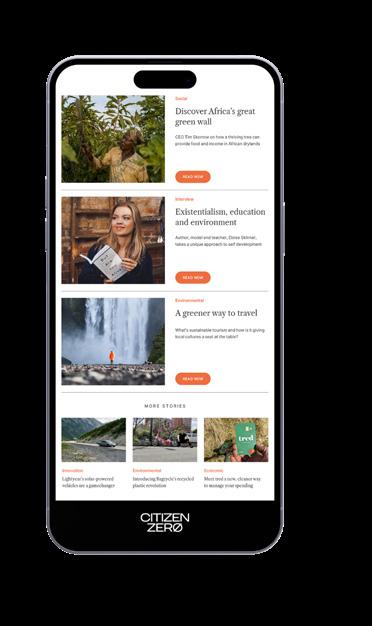
Sign up for your free newsletter Sign up today for exclusive content from the people, organisations, and innovators taking an active role in building a more sustainable, peaceful, and fair planet. citizenzero.online/subscribe
















